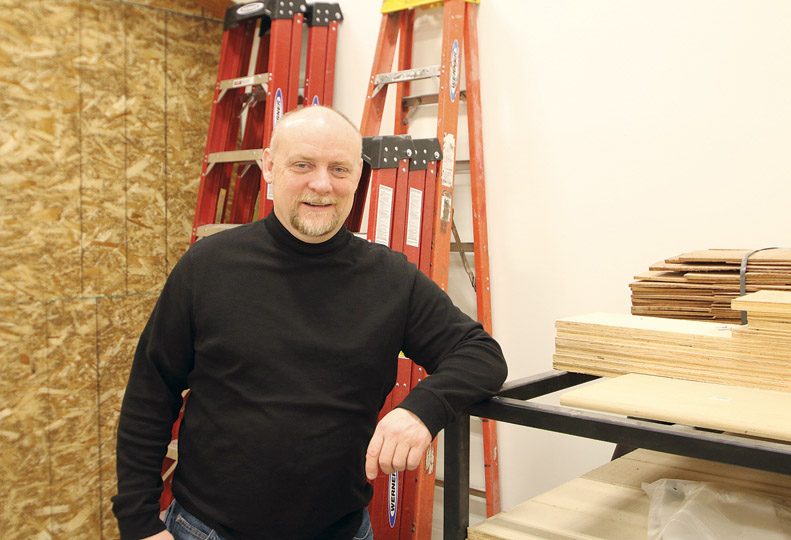
Home » Providing workers conduit to careers in construction
Providing workers conduit to careers in construction
West Plains facility seeks to replenish laborer ranks

April 7, 2016
The Construction Industry Training Council of Washington is helping more than 100 mostly Spokane-area workers start careers in construction trades with classroom and lab courses at its new Eastern Washington Region facility on the West Plains.
CITC, the Bellevue-based construction-worker training nonprofit, operates a state-licensed, nationally accredited apprenticeship and trade school for the construction industry, says Ken Hill, CITC’s Eastern Washington apprenticeship and training coordinator.
It opened its Eastern Washington training center last September at 10424 W. Aero Road, where it occupies 13,000 square feet of space in the northern section of the Aero Road Business Center.
CITC has operated its first Western Region facility in Bellevue since 1985. It also has a Western Region office and training center in Vancouver, Wash., and it also holds classes in Kennewick, Tacoma, Mountlake Terrace, Kingston, and Bellingham.
Hill says the Eastern Washington facility helps participating contractors meet demands for skilled workers here.
Many industry observers say construction trades face potentially persistent worker shortages due to a combination of workers reaching retirement age and recession-related layoffs of construction workers who haven’t returned to the industry.
“A lot of overtime is being worked in the construction industry now,” Hill says.
On any given weekend, 10 to 70 students receive classroom and lab training at the Eastern Washington facility, depending on how many classes are scheduled there.
“We’re well-received on the east side of the state,” Hill says. “More people are hands-on oriented here.”
On recent weekends, the training center has held classes for plumbing, carpentry, and electrical training.
Students in CITC’s apprentice programs learn the technical skills of their trades through formal classroom training and learn the hands-on skills through supervised on-the-job training.
Tuition is funded by sponsoring contractors. Hill says costs vary depending on the course. The CITC website lists tuition at $900 for courses available through the Eastern Region Washington facility, and $1,200 per quarter for mostly night courses offered through the Western Region.
Students are responsible for books and lab fees, which amount to about $1,000. They also typically own their tools.
“Students apply through us, and we dispatch them out to contractors,” Hill says. “Each student puts in a weekend a month at the center. When they leave here, they have a journeyman’s rating in the trade of their choice.”
The apprenticeship training choices currently offered at the Spokane facility are in plumbing, carpentry, and electrical fields.
A portion of a construction craft laborers course also is taught in Spokane. CITC’s Eastern Region also offers a sheet metal course, although it’s held in Kennewick. The largest participation here is electrical trades, followed by plumbing and carpentry.
In Vancouver, by comparison, more people are enrolled in CITC’s plumbing courses.
“We know there’s a shortage of plumbers here, also,” Hill says.
Students represent all levels of apprenticeship training, including fourth-year plumber and electrician apprentices who had been taking online courses prior to the facility opening here.
Hill says courses for more trades will be added as demand increases, likely starting with heating, ventilation, and air-conditioning courses.
Additional trade courses available at other CITC facilities—or online—include painting, heavy-equipment operators, and electrical-low energy/sound and communications.
Though pay varies by trade, Hill says journey-level workers make “good, solid, middle-class wages.”
As of 2014, the average annual wage for carpenters in the Spokane area was $48,940, according to an American City Business Journals analysis of the latest available data from the U.S. Bureau of Labor Statistics.
The analysis calculated average annual Spokane-area electricians’ wages at $58,650 and plumbers’ wages at $56,380.
Journey-level workers are recognized by a state or federal registration agency to be fully qualified to perform the skills of their trade through formal training and work experience.
CITC chose the Spokane area for the Eastern Washington facility because it’s the state’s largest population center east of the Cascades, Hill says.
“We already had (sponsoring) contractors here,” he says. “We have contractors in Idaho, too. It worked out well to be here as opposed to Yakima, Tri-Cities, or Wenatchee.”
The Eastern Washington facility is open to students statewide, however, and some travel from as far as Port Angeles, Wash., and the Portland area to attend courses here.
“We’re able to train people who work out in the middle of nowhere who are able to come here once a month,” Hill says.
CITC will work with community colleges, school districts, and youth job-skill programs to recruit construction-worker prospects, Hill says. It also will offer continuing education courses for electrical and plumbing license renewals, trainee card renewal, and crew leader and project supervisor certification.
The Spokane facility has five instructors, including Hill, who is a master electrician.
All CITC instructors are certified through the National Center for Construction Education & Research.
Hill has been instructing for nearly three years, having graduated from CITC’s Bellevue program in 1989.
He moved here to head the Eastern Washington facility from Covington, Wash., which is in south King County, roughly halfway between the towns of Auburn and Maple Valley.
He’s familiar with Spokane, though.
“I lived here for two years out of high school,” he says. “I’ve had my eye on coming back at some time.”
Vandervert Construction Inc., of Spokane, recently completed a $1.9 million remodel project, creating custom classroom, lab, and meeting space for CITC’s Eastern Washington facility.
Hill says some current CITC students worked on the remodel project as apprentices hired by the electrical subcontractor.
CITC will have an open house with facility tours from 4 to 6 p.m. on April 28.
Latest News Up Close Real Estate & Construction Education & Talent
Related Articles
Related Products





